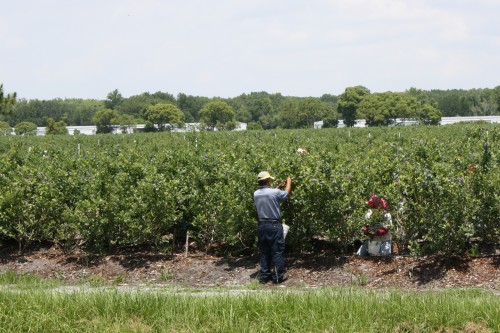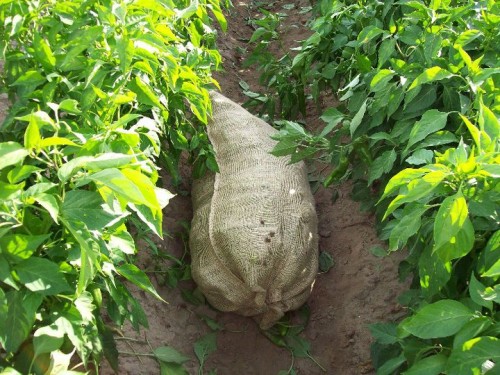WhyHunger is pleased to be partnering with Andrianna Natsoulas, longtime food sovereignty activist and author of the book Food Voices: Stories From the People Who Feed Us. In 2010, Andrianna began a journey across the Americas to capture the stories of people working towards and living a just and sustainable food system. WhyHunger is featuring highlights of these stories, gathered from 70 interviews on a journey that spanned from Nova Scotia to Ecuador to Brazil and beyond, on our Community Voices website.

Since 1977, Carlos Marentes has organized work stoppages in the border region between the United States and Mexico to gain basic rights, higher pay and better conditions for farm workers. Carlos is also organizing to fight the consolidation of agriculture. He is a member of Sin Fronteras, Rural Coalition and is the North American delegate of Via Campesina.
Too often, when you think of the U.S.-Mexico border, images of midnight dashes across the desert and poor border towns teeming with drug cartel operatives, prostitutes and signs for cheap medicines come to mind. What many do not know is that thousands of people cross the border regularly to work on farms on the U.S. side of the border.
Carlos Marentes has been fighting for the rights of farmworkers for over three decades. He is a thoughtful, insightful leader.
The salaries in the border region are very low. The average annual income for a chile picker is less than $6,000 a year, which is far below the U.S. federal poverty income guidelines. This has been going on for decades.
Carlos says, “For many years, our enemies were the farmers and producers. We were on one side, demanding the rights of workers, better wages, improvements of working conditions. On the other side were the farmers protecting their fields and crops. We organized many labor stoppages for better pay. Often we won, increases of 5 cents here, 10 cents there. Little by little, we were improving the wages.”

In 1992, Carlos was in a field, mapping out another work stoppage. It was the first time he saw people testing the chiles, seeing if they were ready to harvest. When the farm owner arrived to discuss the state of the crop with the testers, Carlos asked him what was happening. Carlos explains, “At the beginning of the year the farmer signed a contract with the company to set the price, what to grow, when and how. The contract clearly specified the quality of the product and told the farmer what kind of seeds to use, the fertilizers and the chemicals. Everything was imposed upon the farmer.”
It was then that Carlos realized the situation was much deeper and more complicated than farm owner versus farm worker. “At that point, I realized the farmer did not have control over production or the price. He was also a victim of the food system controlled by a few corporations and food processors who set the rules of the game. At that time, we changed our attitude towards producers and realized they were not the enemy. We started to understand the plight of the agricultural worker in a bigger context. We were so focused on the conditions of the farmworkers that we did not realize that it was a system.”
It was then that he started developing relationships with small farmers across the nation and, eventually, the world. “We realized that we can fight all we can for the rights of farm workers and that we will not make any advances if we fight in isolation. Out of this relationship, we discovered the big picture, that is was a global problem,” says Carlos.
He knows that only a united force could ever dismantle the corporate giants that not only control life on the farms, but also regulations passed in Washington D.C.; negotiations set at the World Trade Organization; projects funded by international and regional finance institutions; and, free trade agreements. For example, the North American Free Trade Agreement forced millions of Mexican farmers off their land.
Until 1994, the Ejido system prevailed in rural Mexico, where communities, rather than individuals, owned land and natural resources. In 1993, the North American Free Trade Agreement was negotiated and that changed the entire rural landscape in Mexico. One of the conditions of NAFTA was the modification of Article 27 of the Mexican constitution. That modification abolished the Ejido system, and immediately allowed widespread land privatization. As a result, nearly 5 million peasants are landless.
 Carlos explains the human impact. “Those policies were also responsible for the displacement of peasants from rural Mexico who came to the United States, to cross the border, to risk their lives, to work in intensive industrial agriculture. We realized that our life was connected to something bigger: to change the neo-liberal model of agriculture.”
Carlos explains the human impact. “Those policies were also responsible for the displacement of peasants from rural Mexico who came to the United States, to cross the border, to risk their lives, to work in intensive industrial agriculture. We realized that our life was connected to something bigger: to change the neo-liberal model of agriculture.”
Carlos will continue fighting in the border region for better wages and improved working conditions for farmworkers. He will also organize and stand in solidarity with peasants around the word to change the system and stop the policies that are barriers to food sovereignty.
“Our fight, our struggle includes two aspects,” he says. “The first aspect is the day-to-day fight to protect the rights of the workers for better working and living conditions. That is something we don’t give up on, we keep fighting. That only alleviates the problem in the short run.
“The second aspect, in the long run, is to fight and organize to rebuild the peasant economies that have been destroyed and where these workers are coming from. This is the root of the problem. If many of the farm workers are able to survive in their own land, they will not have to cross the border, they will not have to become part of the cheap labor that is the foundation, the backbone of industrial commercial agriculture.”


